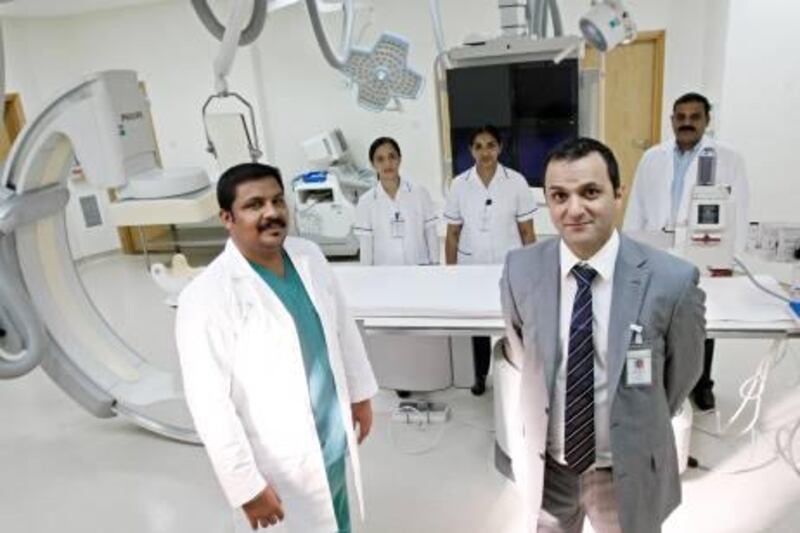A Dh7 million "hybrid" operating theatre will allow doctors at a Dubai hospital to treat a host of conditions quickly under one roof and free up bed spaces for new patients.
The theatre at Rashid Hospital combines a surgical room with an angiography suite and large 3D imaging equipment, such as a CT scanner, enabling a team of doctors, including neurosurgeons, vascular surgeons and gastroenterologists, to offer a rapid response to patients' treatment needs.
For some patients, surgery waiting time could be reduced by up to five days.
Dr Ayman Al Sibaie, a consultant intervention radiologist at the hospital, said: "Before, the patient would come here [to the original operating theatre] for angiography.
"Afterwards he would go back to his ward where he would be booked into theatre after four or five days. So he spends days in the hospital just waiting for his appointment."
Angiography involves injecting fluids into the bloodstream that make blood vessels visible on X-rays. The process is used to closely examine the arteries.
With everything housed together, quicker surgeries are finally possible, said Rasik Ahmad, a senior radiographer and one of the five-member team operating the hybrid theatre.
"Everything is now at our fingertips. Before we had to keep running around for everything, in and out, in and out. Now everything is under one roof so it is a big advance."
Long waiting times are not only a financial burden on the hospital and the patient, said Dr Al Sibaie, but also take up needed bed space.
"Every bed occupied in the hospital means you are preventing another patient from using it," he said.
On occasions when the hospital's wards are full, a percentage of the patients taking up beds are awaiting their next surgical procedure, he added.
"If we can release them faster, we can treat more patients."
There are many benefits to having the CT scanner in the theatre, said Mr Ahmad.
"With the old machine, after our procedures we needed to transfer the patient to the CT-scan department. With this one, we do the procedure, we do the CT scan, we do everything on the spot."
As well as being time-efficient, the new equipment allows doctors to provide an alternative to traditional surgeries, thus reducing a patient's recovery time and risk of illness.
"We can [provide] more advanced procedures with much higher quality. This will lead to a very precise procedure and a better outcome for the patient," said Dr Al Sibaie, who has seen more than 100 patients come through the theatre since it opened last month.
There are between 1,200 and 1,400 coronary angioplasty procedures carried out at Rashid Hospital annually. The surgery to open blocked arteries is less invasive than open-heart surgery, of which there are 400 performed by the Dubai Health Authority each year at Dubai Hospital.
New procedures at Rashid Hospital will include implanting heart valves through catheters, said Dr Fahad Omar Baslaib, a consultant and head of the cardiology unit.
Conditions such as aortic valve stenosis, which occurs when the aortic valve through which blood from the heart is pumped to the rest of the body does not open properly, could previously only be corrected by open-heart surgery.
"With this technology we can replace the valve through an angiography catheter. You go through the artery in the top of the leg [the femoral artery] creating an opening of about one centimetre, and you replace the [defective valve] with a new valve," said Dr Baslaib.
The non-invasive surgery has benefited 69-year-old Abdul Al Fahim, who was operated on several days ago.
One of four patients who have had the procedure at the hospital since the theatre opened, Mr Al Fahim was mobile 24 hours later, something that would not have been possible had he undergone open-heart surgery.
"Definitely, he would not be able to walk after the surgery," said Raymond Alberto, a cardiac cath lab nurse, who added the patient was showing no signs of complications.
Aside from the advances in heart surgery, the new hybrid theatre will be used to treat all manner of illnesses. "We treat the whole body, from head to toe," said Dr Al Sibaie.






